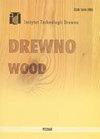Laccase treatment of Norway spruce wood surface improves resistance and copper fixation of treated wood
IF 0.9
4区 农林科学
Q3 MATERIALS SCIENCE, PAPER & WOOD
引用次数: 11
Abstract
The effects of laccase from the white-rot basidiomycete fungus Trametes versicolor on Norway spruce wood (Pices abies) surface were studied. Experiments were performed at room temperature and at pH 4.6, without the addition of mediators. Biological, chemical and physical properties of the treated wood surface were examined by a wood decay test, a scanning electron microscopy (SEM), a Fourier transform infrared (FTIR) spectroscopy and a copper leaching test. Laccase pre-treatment of Norway spruce wood surface was shown to reduce wood decay by brown-rot fungus, Gloeophyllum trabeum and white-rot fungus, Trametes versicolor. SEM images showed expanded wood cell walls, closed pits and a more even surface after laccase treatment. FTIR analysis indicated that laccase not only catalyse depolymerisation of lignin, but also affect other wood cell wall components, such as hemicellulose and cellulose. We showed that laccase treatment altered wood properties in a way that improved wood resistance to decay and prevented leaching of copper from impregnated wood.漆酶处理挪威云杉木材表面提高了木材的抗性和铜固定
研究了白腐担子真菌色曲霉漆酶对挪威云杉木材表面漆酶的影响。实验在室温和pH 4.6下进行,不添加介质。通过木材腐烂测试、扫描电子显微镜(SEM)、傅里叶变换红外光谱(FTIR)和铜浸出测试来检测处理后木材表面的生物、化学和物理特性。漆酶预处理挪威云杉木材表面可以减少褐腐菌和白腐菌对木材的腐蚀。扫描电镜图像显示,漆酶处理后,木材细胞壁膨胀,凹坑封闭,表面更加均匀。FTIR分析表明,漆酶不仅催化木质素的解聚合,而且还影响木材细胞壁的其他组分,如半纤维素和纤维素。我们发现漆酶处理改变了木材的性能,从而提高了木材的抗腐性,并防止了浸渍木材中铜的浸出。
本文章由计算机程序翻译,如有差异,请以英文原文为准。
求助全文
约1分钟内获得全文
求助全文
来源期刊

Drewno
MATERIALS SCIENCE, PAPER & WOOD-
CiteScore
1.10
自引率
12.50%
发文量
0
审稿时长
>12 weeks
期刊介绍:
Wood. Research papers. Reports. Announcements" ("Drewno") is an international scientific journal that publishes original results of innovatory basic and applied research concerning technological, technical, economic and ecological issues important for the wood science and forest-based industries, including their environment, and interesting to the international recipients. "Drewno" is an Open Access biannual journal.
Aims and scope:
wood science: anatomy, biology, chemistry, physics
wood mechanical and chemical technology, inter alia, sawmilling, composite wood products, wooden construction, furniture making, wood pulp, paper making
material engineering, biocomposites, nanocomposites
material management
environmental protection, safety of the processes, products and working stations
biotechnology
bioenergy, biofuels
forestry: harvesting and wood quality
wood-based industries economics
The Editorial Board of the journal especially welcomes articles concerning increase in wood resources (wood mobilisation); innovative composites and lignocellulosic materials; new trends in the protection, modification and finishing of wood; biorefining of raw wood material; "green" building; new technologies of wood waste recycling; sustainable development; innovation management; and business networks.
 求助内容:
求助内容: 应助结果提醒方式:
应助结果提醒方式:


